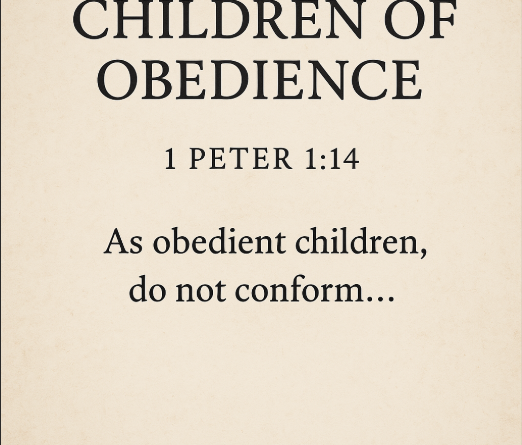Living In Obedience Through Everyday Choices
You probably think of obedience as something big — a life-changing decision, a dramatic turn toward God. That matters. But most of your spiritual life is actually formed by the small choices you make every day. This article explores how obedience to God in daily life becomes the rhythm of your habits, the filter for your decisions, and the way you reflect Christ in ordinary moments. You’ll get practical steps, biblical anchors, and a compassionate push to make your everyday choices count.
Why Everyday Choices Matter
Every day choices create your spiritual trajectory. The meals you eat, the words you speak, the way you respond to interruptions — these small acts add up. When you intentionally cultivate obedience to God in daily life, you aren’t just following a rulebook; you’re shaping character, forming patterns that make faith sustainable, and allowing God’s will to become your instinct.
What Obedience Really Is
Obedience is more than compliance or legalism. It’s a posture of the heart that aligns your will with God’s will. Jesus taught that true obedience flows from loving him and abiding in his word; it’s relational, not merely dutiful. When you see obedience as a loving response rather than a checklist, obedience to God in daily life becomes both freeing and purposeful.
Biblical Foundation for Daily Obedience
The Bible repeatedly points to the importance of walking in God’s ways day by day. You are invited to present your life as a living sacrifice, to trust God with your steps, and to walk by the Spirit. These commands and invitations shape the way you approach everyday decisions.
- For the call to present yourself fully to God, see Romans 12:1-2.
- For trusting God’s guidance, see Proverbs 3:5-6.
- For walking by the Spirit rather than gratifying the flesh, see Galatians 5:16-25.
The Heart Behind the Habit
You’ll find that obedience to God in daily life starts in the heart. Jesus says that the person who hears and does his word is blessed. That means obedience and hearing are interconnected — you can’t do what you don’t know, and you won’t truly do what you don’t want. Cultivate desire for God through worship, Scripture, and time with him, and you’ll find your habits following your affections.
See Jesus’ teaching on hearing and doing: Luke 11:28.
Simple Decisions That Become Spiritual Disciplines
You don’t need to overhaul your life overnight. The point is to convert ordinary moments into spiritual opportunities. Here are examples where obedience to God in daily life plays out:
- How you start your day — choosing prayer or a quick check of your phone sets the tone.
- The way you speak — choosing truth, grace, and encouragement in conversations.
- Use of time — prioritizing rest and Sabbath, saying no to busyness that crowds out God.
- Work ethic — doing your work diligently as an act of worship.
- Financial choices — practicing generosity and stewardship rather than impulse spending.
- Relationships — choosing humility, forgiveness, and patience over pride and reactivity.
Each of these choices, repeated, becomes a spiritual discipline that shapes your character and witness.
Morning and Evening Rhythms
Your morning and evening routines are fertile ground for obedience to God in daily life. A brief time of prayer and Scripture in the morning centers you before the day’s demands. In the evening, reflection and confession help you learn from mistakes and rest in God’s grace. You’ll find that rhythms, more than intensity, sustain your obedience.
For the practice of daily devotion and training, consider 1 John 2:3-6, which emphasizes living as Jesus did as evidence of knowing him.
Work and Vocation as Worship
You don’t need a church job to serve God. The way you do your regular work — with excellence, integrity, and service — is an expression of obedience to God in daily life. Paul urges believers to offer their bodies as living sacrifices; your 9-to-5 is a field of worship when you dedicate your work to God.
See the call to offer your life: Romans 12:1.
Speech and Relationships
Your words shape reality. Choosing to speak truth in love, to listen, and to refrain from gossip are practical ways you exercise obedience to God in daily life. Relationships are where faith gets tested; they reveal whether obedience is theoretical or real. Remember that love is the fulfillment of the law, and your daily speech is a place to demonstrate that love.
This relates to Jesus’ challenge to let your light shine: Matthew 5:16.
Handling Anger and Conflict
You’ll face conflict. How you respond matters. Choosing a calm tone, seeking reconciliation quickly, and refusing to nurse resentment are concrete acts of obedience to God in daily life. Scripture calls you to pursue peace and be quick to listen, slow to speak, and slow to become angry — a practical guide for everyday conflicts.
Proverbs and New Testament instructions on relationships provide wisdom here: Proverbs 3:5-6 and Matthew 18:15 (on resolving conflict).
Money, Generosity, and Stewardship
Your finances are a daily seminar on obedience. Will you trust God’s provision or chase security in wealth? Generosity is a tangible test of where your heart is. You can obey God in daily life by budgeting with wisdom, giving consistently, and using resources to bless others.
For teaching on stewardship and generosity, see Matthew 6:33 and 2 Corinthians 9:6-7.
The Role of the Holy Spirit
You’re not expected to obey by sheer willpower. The Holy Spirit empowers you to live in obedience, convicts you, comforts you, and produces fruit in your life. Learning to depend on the Spirit — through prayer, sensitivity, and submission — makes obedience to God in daily life sustainable and joyful.
Paul’s contrast between flesh and Spirit is a helpful reminder: Galatians 5:16-25.

Practical Framework for Daily Decisions
When a choice confronts you, a simple framework helps you act obediently rather than reactively. Use these steps to convert impulse into disciplined obedience:
- Pause — don’t make an immediate, emotional reaction.
- Pray briefly — ask God for wisdom and clarity.
- Check Scripture — is there a principle that applies?
- Choose the loving option — consider what best reflects Christ.
- Follow through — act and, if necessary, repent quickly.
This process trains you to make obedience to God in daily life a practiced reflex rather than a trial-by-fire.
Overcoming Busyness and Distraction
Busyness is one of the biggest enemies of obedience. When your schedule is packed, you tend to outsource your spiritual life to the margins. You can resist that pull by ruthlessly protecting times of solitude with God, simplifying commitments, and prioritizing what truly matters. Saying no to good things is often a yes to God’s best for your life.
See Jesus’ call to seek first God’s kingdom as you prioritize: Matthew 6:33.
Temptation and Small Compromises
Temptations aren’t always dramatic; often they whisper in small compromises. You’ll need to guard the little gates: the incremental lies, the small ethical shortcuts, the daily adjustments that lead away from holiness. Practicing obedience to God in daily life means taking those whispers seriously and choosing integrity in the small things.
Jesus said that if you are faithful in little, you will be faithful in much — a principle worth remembering: Luke 16:10.
When You Fail: Grace, Confession, and Restoration
You will fail. Everyone does. How you respond to failure reveals the maturity of your obedience. The gospel calls you to confess, receive grace, and get back up. Confession should be quick, honest, and specific; restoration often involves making amends and changing patterns. Obedience to God in daily life is not the absence of failure, but the presence of repentance and renewal.
James encourages you to be doers of the word and not merely hearers: James 1:22.
Forming Habits That Support Obedience
Habits are the scaffolding of daily obedience. Start small: a five-minute prayer time, a short passage of Scripture, one act of service each week. Build gradually. Use reminders, accountability, and environmental changes to support your new routines. Over time, these habits become reflexive expressions of obedience to God in daily life.
Hebrews points to running with perseverance, suggesting a disciplined, long-term view: Hebrews 12:1-2.
Community and Accountability
You weren’t meant to do this alone. Community gives you correction, encouragement, and practical help. Being honest with trusted friends about your struggles makes obedience to God in daily life more achievable. Accountability partners and small groups create structures for mutual growth and faithful living.
Consider Paul’s emphasis on mutual building up in the body of Christ: Romans 12:4-8.
Spiritual Disciplines That Shape Daily Choices
Certain disciplines consistently support obedience: prayer, Scripture reading, fasting, worship, service, and solitude. You don’t need to practice all at once. Choose a few that resonate, and let them shape your thinking and actions. These disciplines help you listen to God and respond faithfully in daily situations.
Jesus modeled dependence on his Father through prayer; his life is a pattern of obedience: Luke 5:16.
Digital Life and Obedience
Your phone can be a tool for worship or a constant competitor for your attention. Practice discipline with notifications, social media, and screen time. Decide in advance what online content you will consume and what you’ll avoid. Using technology intentionally helps you maintain obedience to God in daily life amid digital noise.
Scriptural wisdom about self-control is helpful as you navigate online choices: Galatians 5:22-23.
Food, Health, and Stewardship of the Body
Your body is a temple; caring for it is part of your stewardship. Choosing healthy habits, rest, and moderation honors God and equips you for faithful service. Obedience to God in daily life includes listening to your body, setting boundaries, and avoiding excess.
The call to honor God with your body is clear in Paul’s letters: 1 Corinthians 6:19-20.
Parenting and Modeling Obedience
If you’re a parent or influence children, your daily choices teach them as much as your words. Children learn obedience through modeled behavior: consistent prayer, confession, service, and humility. You’ll find that your daily obedience to God in daily life becomes the most effective classroom for the next generation.
Proverbs emphasizes the power of teaching and discipline in upbringing: Proverbs 22:6.
Workplaces as Mission Fields
Your workplace is one of the primary arenas for obedience. Being honest, generous, and excellent in your job is a witness that opens doors for Gospel conversations. Use everyday interactions — emails, small acts of kindness, ethical choices — to show that obedience to God in daily life informs your professional demeanor.
Paul’s teaching about serving wholeheartedly applies directly: Colossians 3:23-24.
The Long View: Obedience Produces Fruit
Obedience is rarely about immediate reward. It’s about the long-term formation of holiness and fruitfulness. As you consistently choose obedience, you build spiritual muscles that produce love, joy, peace, patience, kindness, goodness, faithfulness, gentleness, and self-control. The fruit of obedience is seen over time, and it blesses both you and those around you.
Paul describes the fruit of the Spirit as the outcome of walking by the Spirit: Galatians 5:22-23.
Stories of Everyday Obedience in Scripture
The Bible is full of people who demonstrated obedience through daily choices. Consider Daniel, who chose daily faithfulness even in exile; Ruth, who chose loyalty and service; and the apostles, who chose humility and perseverance. Their ordinary choices became extraordinary testimonies.
- Daniel’s commitment to prayer and faithfulness: Daniel 6:10.
- Ruth’s loyalty and service: Ruth 1:16-17.
- The apostles’ persistent witness: Acts 4:20.
Making a Plan You Can Keep
Ambitious plans can fail quickly. Instead, make a plan you can keep by choosing small, specific actions tied to daily life. Maybe you start with morning prayer, a mid-day Scripture verse, and an evening reflection. Use reminders, pair new habits with existing ones, and celebrate small wins. These manageable steps help you grow in obedience to God in daily life without burning out.
James reminds you to be doers of the word, which is a practical invitation to put faith into action: James 1:22.
When Obedience Costs You
Sometimes obedience will cost you comfort, reputation, or convenience. You’ll have to choose what honors God over what’s popular. Jesus warns that following him can bring division, but he also promises reward and presence. In those hard moments, your commitment to obedience to God in daily life is a profound witness.
Jesus’ call to pick up your cross and follow him is sobering and freeing: Luke 9:23.
Loving Obedience vs. Legalism
There’s a big difference between loving obedience and legalistic rule-following. Loving obedience is flexible, merciful, and rooted in relationship. Legalism is rigid and often self-righteous. You want your everyday obedience to flow from gratitude for grace, not from fear of failure or desire for approval.
Paul’s warning against legalism and his call to live in the Spirit can help you keep the balance: Galatians 5:1.
Celebrating Progress and God’s Faithfulness
Don’t minimize progress. Celebrate how small, obedient choices have changed you, your relationships, or your priorities. Remember God’s faithfulness in your journey; recalling how he guided and sustained you fuels future obedience. Gratitude, spoken and remembered, strengthens your ability to keep choosing God.
Psalm 103 calls you to remember the Lord’s benefits and be grateful for his mercy (see Psalm 103).
Final Encouragement
Living in obedience through everyday choices is not about perfection. It’s about turning repeatedly toward God, letting His Spirit shape your desires, and making decisions that reflect Christ. Start small, be patient, rely on the Spirit, and let community carry you when you need support. Your daily obedience matters more than you may ever fully see.
If you want a guiding verse to return to, remember Jesus’ words: “Blessed rather are those who hear the word of God and obey it.” See Luke 11:28.
Explore More
For further reading and encouragement, check out these posts:
👉 7 Bible Verses About Faith in Hard Times
👉 Job’s Faith: What We Can Learn From His Trials
👉 How To Trust God When Everything Falls Apart
👉 Why God Allows Suffering – A Biblical Perspective
👉 Faith Over Fear: How To Stand Strong In Uncertain Seasons
👉 How To Encourage Someone Struggling With Their Faith
👉 5 Prayers for Strength When You’re Feeling Weak

📘 Jesus and the Woman Caught in Adultery – Grace and Mercy Over Judgement
A powerful retelling of John 8:1-11. This book brings to life the depth of forgiveness, mercy, and God’s unwavering love.
👉 Check it now on Amazon 🛒💥
🔥 “Every great message deserves a home online.” 🌍💬🏡
Don’t let your calling stay hidden. Start a Christian blog or website using Hostinger — with 99.9% uptime, a free domain, and SSL, your voice can shine for God’s glory anytime, anywhere.
💥 Begin today. 🛒 Try it RISK-FREE! ✅
✝️ “Your body is God’s temple — care for it with purpose.” 💪💖🏛️
Renew your energy and restore balance naturally. Mitolyn helps support a healthy metabolism, giving you the vitality to live out God’s calling with strength and confidence.
🔥 Unlock Your Metabolic Power! ⚡Burn More Calories & Feel Great With Mitolyn. 💪
👉 Start Today. 🚀 Check Price Now. 🛒💰
💰 As a ClickBank & Amazon Affiliate, I earn from qualifying purchases.
📖 Acknowledgment: All Bible verses referenced in this article were accessed via Bible Gateway (or Bible Hub).
🚀 Want to explore more? 👉 Dive into our new post on Why Jesus? and experience the 🔥 life-changing truth of the Gospel!








